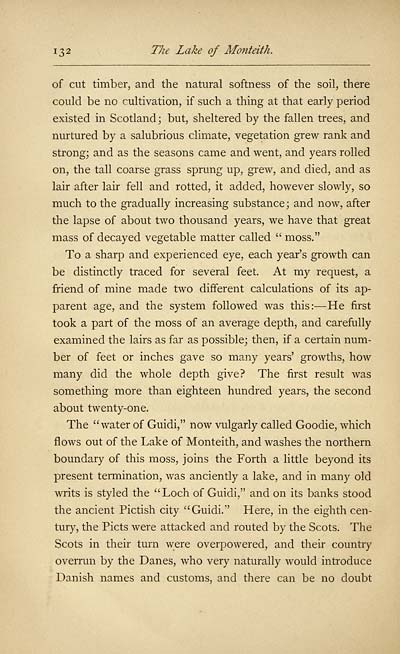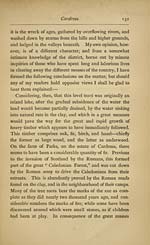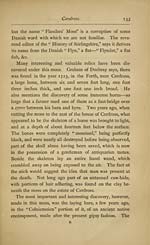Summer at the Lake of Monteith
(146) Page 132
Download files
Complete book:
Individual page:
Thumbnail gallery: Grid view | List view

132 The Lake of Monteith.
of cut timber, and the natural softness of the soil, there
could be no cultivation, if such a thing at that early period
existed in Scotland; but, sheltered by the fallen trees, and
nurtured by a salubrious climate, vegetation grew rank and
strong; and as the seasons came and went, and years rolled
on, the tall coarse grass sprung up, grew, and died, and as
lair after lair fell and rotted, it added, however slowly, so
much to the gradually increasing substance; and now, after
the lapse of about two thousand years, we have that great
mass of decayed vegetable matter called " moss."
To a sharp and experienced eye, each year's growth can
be distinctly traced for several feet. At my request, a
friend of mine made two different calculations of its ap-
parent age, and the system followed was this: — He first
took a part of the moss of an average depth, and carefully
examined the lairs as far as possible; then, if a certain num-
ber of feet or inches gave so many years' growths, how
many did the whole depth give? The first result was
something more than eighteen hundred years, the second
about twenty-one.
The "water of Guidi," now vulgarly called Goodie, which
flows out of the Lake of Monteith, and washes the northern
boundary of this moss, joins the Forth a little beyond its
present termination, was anciently a lake, and in many old
writs is styled the "Loch of Guidi," and on its banks stood
the ancient Pictish city "Guidi." Here, in the eighth cen-
tury, the Picts were attacked and routed by the Scots. The
Scots in their turn were overpowered, and their country
overrun by the Danes, who very naturally would introduce
Danish names and customs, and there can be no doubt
of cut timber, and the natural softness of the soil, there
could be no cultivation, if such a thing at that early period
existed in Scotland; but, sheltered by the fallen trees, and
nurtured by a salubrious climate, vegetation grew rank and
strong; and as the seasons came and went, and years rolled
on, the tall coarse grass sprung up, grew, and died, and as
lair after lair fell and rotted, it added, however slowly, so
much to the gradually increasing substance; and now, after
the lapse of about two thousand years, we have that great
mass of decayed vegetable matter called " moss."
To a sharp and experienced eye, each year's growth can
be distinctly traced for several feet. At my request, a
friend of mine made two different calculations of its ap-
parent age, and the system followed was this: — He first
took a part of the moss of an average depth, and carefully
examined the lairs as far as possible; then, if a certain num-
ber of feet or inches gave so many years' growths, how
many did the whole depth give? The first result was
something more than eighteen hundred years, the second
about twenty-one.
The "water of Guidi," now vulgarly called Goodie, which
flows out of the Lake of Monteith, and washes the northern
boundary of this moss, joins the Forth a little beyond its
present termination, was anciently a lake, and in many old
writs is styled the "Loch of Guidi," and on its banks stood
the ancient Pictish city "Guidi." Here, in the eighth cen-
tury, the Picts were attacked and routed by the Scots. The
Scots in their turn were overpowered, and their country
overrun by the Danes, who very naturally would introduce
Danish names and customs, and there can be no doubt
Set display mode to:
![]() Universal Viewer |
Universal Viewer | ![]() Mirador |
Large image | Transcription
Mirador |
Large image | Transcription
Images and transcriptions on this page, including medium image downloads, may be used under the Creative Commons Attribution 4.0 International Licence unless otherwise stated. ![]()
| Histories of Scottish families > Summer at the Lake of Monteith > (146) Page 132 |
|---|
| Permanent URL | https://digital.nls.uk/94835046 |
|---|
| Description | A selection of almost 400 printed items relating to the history of Scottish families, mostly dating from the 19th and early 20th centuries. Includes memoirs, genealogies and clan histories, with a few produced by emigrant families. The earliest family history goes back to AD 916. |
|---|

